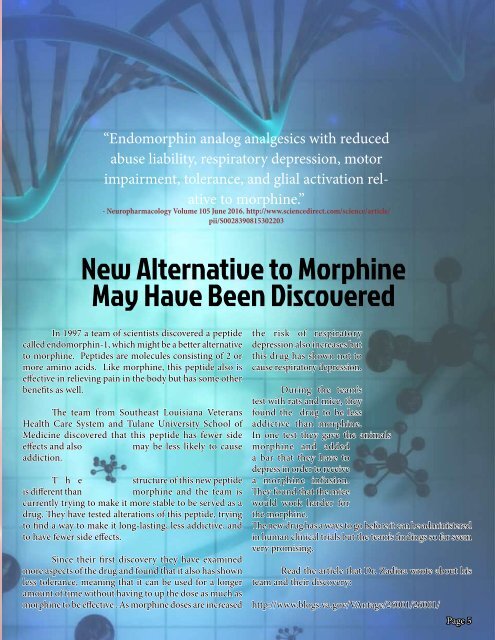RHD 2016 2nd Quarter
Create successful ePaper yourself
Turn your PDF publications into a flip-book with our unique Google optimized e-Paper software.
“Endomorphin analog analgesics with reduced<br />
abuse liability, respiratory depression, motor<br />
impairment, tolerance, and glial activation relative<br />
to morphine.”<br />
- Neuropharmacology Volume 105 June <strong>2016</strong>. http://www.sciencedirect.com/science/article/<br />
pii/S0028390815302203<br />
New Alternative to Morphine<br />
May Have Been Discovered<br />
In 1997 a team of scientists discovered a peptide<br />
called endomorphin-1, which might be a better alternative<br />
to morphine. Peptides are molecules consisting of 2 or<br />
more amino acids. Like morphine, this peptide also is<br />
effective in relieving pain in the body but has some other<br />
benefits as well.<br />
The team from Southeast Louisiana Veterans<br />
Health Care System and Tulane University School of<br />
Medicine discovered that this peptide has fewer side<br />
effects and also<br />
may be less likely to cause<br />
addiction.<br />
T h e structure of this new peptide<br />
is different than<br />
morphine and the team is<br />
currently trying to make it more stable to be served as a<br />
drug. They have tested alterations of this peptide, trying<br />
to find a way to make it long-lasting, less addictive, and<br />
to have fewer side effects.<br />
Since their first discovery they have examined<br />
more aspects of the drug and found that it also has shown<br />
less tolerance, meaning that it can be used for a longer<br />
amount of time without having to up the dose as much as<br />
morphine to be effective . As morphine doses are increased<br />
the risk of respiratory<br />
depression also increases but<br />
this drug has shown not to<br />
cause respiratory depression.<br />
During the team’s<br />
test with rats and mice, they<br />
found the drug to be less<br />
addictive than morphine.<br />
In one test they gave the animals<br />
morphine and added<br />
a bar that they have to<br />
depress in order to receive<br />
a morphine infusion.<br />
They found that the mice<br />
would work harder for<br />
the morphine.<br />
The new drug has a ways to go before it can be administered<br />
in human clinical trials but the team’s findings so far seem<br />
very promising.<br />
Read the article that Dr. Zadina wrote about his<br />
team and their discovery:<br />
http://www.blogs.va.gov/VAntage/26001/26001/<br />
Page 5
















